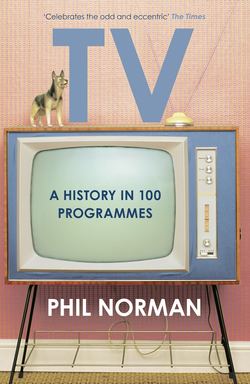Читать книгу A History of Television in 100 Programmes - Steve Berry, Phil Norman - Страница 7
COOKERY (1946–51) BBC The first celebrity chef.
ОглавлениеTHE FIRST PERSON TO sling a skillet in the studio was French restaurateur, novelist and boulevardier Xavier Marcel Boulestin. He essayed suave hob-side demonstrations wearing a double-breasted suit during the BBC’s 1930s infancy in programmes like Bee for Boulestin and Blind Man’s Buffet. However, the cult of the celebrity chef – the omnipresent gastronome as relaxed in front of the camera as at the oven door – began with Philip Harben.
Rotund, neatly bearded and rarely seen out of an apron, Harben emerged from the post-war landscape of ration coupons and meat queues to become an ever-present face on TV via his first series, the sensibly-titled Cookery. Harben rustled up austerity lobster vol-au-vents and welfare soufflés for the vicarious pleasure of families struggling on one slice of condemned corned beef a week, but few recognise just how many aspects of the twenty-first century tele-cookery landscape owe him their existence. Without Harben, we may never have witnessed these culinary devices:
THEATRICALITY – The son of film actors, Harben knew how to put his recipes, and himself, across to best effect in the muffled turmoil of early television, keeping the stream of patter going as the sheets of flame leapt from his flambé pan. ‘He stands almost alone,’ remarked an awed Reginald Pound, ‘a precision instrument of self-expression.’ 14
MERCHANDISE – Not content with putting his grinning, bearded face on jars of Heinz pickle and packs of Norfolk stuffing, Harben supplemented his meagre BBC salary with the launch of Harbenware, heavy gauge saucepans with a special ‘Harbenized’ non-stick coating, bearing labels festooned with his grinning, bearded face.
BACK TO BASICS – The ridicule endured by Delia Smith for demonstrating how to boil an egg was nothing new to Harben, who devoted the lion’s share of one programme to making a cup of tea. Pot-warming temperatures, infusion times, even the height from which to pour the water onto the leaves were discussed at rigorous length.
NATIONAL AND INTERNATIONAL DISHES – Harben got away from the standard Mayfair dinner party aspirations of TV cookery to celebrate Britain’s regional food in 1951’s Country Dishes, rustling up everything from Cornish pasties to jellied eels. If technology had allowed him a global culinary excursion he’d have made one – instead he brought the resident chef from NBC’s Home show to the UK for a national dish swapping session in 1955’s Transatlantic Exchange.
SLUTTY INGREDIENTS SCANDAL – Delia’s controversial dalliance with frozen mash and other timesavers was pre-empted in 1954 when Harben rustled up sole bonne femme using haddock and milk instead of the traditional Dover sole and wine. An outraged telegram from catering students at Blackpool Technical College reached the Director General within hours. ‘The BBC permits Harben to clown with classical French dishes in a way which exposes the British kitchen to a justifiable scorn,’ 15 they raged. Whatever, they demanded, would the Americans think if this got out?
NUTRITIONAL CRUSADE – Getting the nation eating properly was another Harben innovation. This being 1949, however, the problem was that folk weren’t eating enough. Specifically, Harben attacked the ‘sparrow-sized breakfasts’ of Britain’s working men. ‘We cannot stay a first-class power if we give up eating a first-class breakfast,’16 he told the press, encouraging British men to get up earlier and fry their own bacon if necessary. Harben’s Great British Breakfast was possibly unique in food campaigns for also recommending a few post-prandial minutes with a newspaper and a cigarette.
PRIMADONNA ANTICS – Every great TV chef must exhibit a total lack of humour at a crucial moment. Harben set the template in 1957 on the set of The Benny Hill Show. He’d sportingly played the stooge before to the chaotic Mr Pastry and rebarbative Fred Emney, but Hill took a step too far. ‘They submitted a sketch to me which I considered degrading. The whole thing indicated that I couldn’t cook. That’s no joke to me.’17
MOLECULAR GASTRONOMY – Beating Heston Blumenthal by over forty years, Harben stocked up on microscopes, slide rules and calculus tables for his 1964 ITV series The Grammar of Cookery. With technical advice from microbiologist A. L. Bacharach and editions called ‘The Three Faces of Meringue’ and ‘Egg Liaison’, he took cookery to new heights of sophistication. ‘If you are a great cook, madam,’ he claimed, ‘you are a singer of songs, a poet, an actress, a painter, a pianist. You are Maria Callas, you are Cilla Black, you are Vanessa Redgrave all rolled into one. And the world is at your feet.’18
